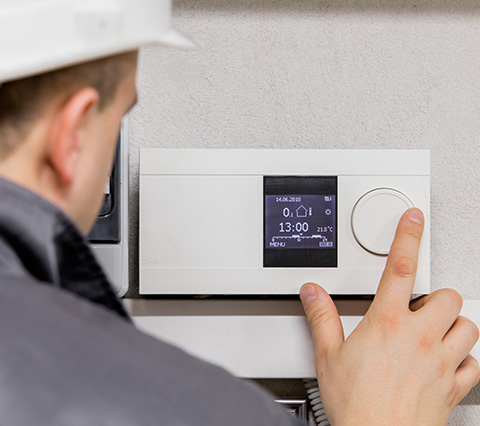Thermostats: Your Heating System's Best Friend Or Worst Enemy?
September 13, 2016

Every homeowner should be familiar with their home's heating and cooling systems -- seems pretty obvious, right? What a lot of folks might not know is that their thermostat alone might make a huge difference in their home's energy efficiency, and, therefore, their energy bill.
There are a few different types of thermostats available to homeowners, each with different advantages and drawbacks.
"Smart" Thermostats
For the most efficient option, you may want to consider a WiFi enabled digital thermostat. These gadgets have several features that enhance your home's efficiency, which vary based on the brand and model of thermostat you choose. Some of these features include being controlled via smartphone or computer, meaning you can change the temperature when you aren't even home, and learning your temperature preferences at specific times of the day. For example, if you like it to be 78 degrees when you're at home during the winter, you can set it so it will turn to that temperature before you get home from work. Your home will then be the perfect temperature when you arrive, while keeping the temperature and your energy costs low while no one is home.
Our CEO Bob's favorite feature of his NEST thermostat is that when he is away on a business trip or vacation, he can set an "away" temperature to override the normal programming, keeping the energy usage especially low while he's gone. Then, when his plane lands, he can turn up the heat and come back to a toasty home in no time. Some of these can also send you notifications when there are abnormal temperature swings, so you can keep an eye on your home while you're not around.
While these have a higher upfront cost than mechanical and programmable thermostats, with prices ranging from $120-$250, they will help save money on your energy costs in the long run -- NEST reports that independent studies have shown their models save homeowners an average of 10 - 12% on heating bills and 15% on cooling bills.
Electronic Thermostats
Electronic programmable thermostats are a cheaper and still decent choice for modern homes and heating systems. These work using digital sensors to gauge the temperature of the room and have an accuracy rate of 1 degree to the set temperature. The cheaper models are close to the price of a mechanical thermostat at $20, but can go up to $80. Because they're more accurate in gauging the temperature of the room they are in, they don't waste energy by overheating your home before shutting off. What you put into this is what you get out of it, however; a poorly programmed thermostat will still cost you money.
The Mechanical Thermostat
The least efficient and most common of these is the mechanical thermostat. This thermostat works using two laminated pieces of metal that are glued together (called a bimetallic strip) which have different expansion rates when heated and cooled. When one strip expands more than the other, the strip bends and completes a circuit that turns the heating system on.
When you set this thermostat to a certain temperature, the heater connected to the thermostat turns on until the room reaches that set temperature and the strip straightens, opening the circuit. These thermostats are only accurate within 2-5 degrees of the set temperature.
The best thermostats to invest in, in terms of saving money over time and keeping your home the most comfortable at the least cost, are the programmable and Wi-Fi enabled options. If you have the money, it would be a good idea to invest in a Wi-Fi enabled one, but a programmable thermostat is still an excellent middle choice. If you have a mechanical thermostat, it's time to upgrade. Depending on your energy company, you may even be eligible for rebates or discounted Wi-FI thermostats with free installation. To find out more, give us a call at 888.840.6641
 Every homeowner should be familiar with their home's heating and cooling systems -- seems pretty obvious, right? What a lot of folks might not know is that their thermostat alone might make a huge difference in their home's energy efficiency, and, therefore, their energy bill.
Every homeowner should be familiar with their home's heating and cooling systems -- seems pretty obvious, right? What a lot of folks might not know is that their thermostat alone might make a huge difference in their home's energy efficiency, and, therefore, their energy bill.